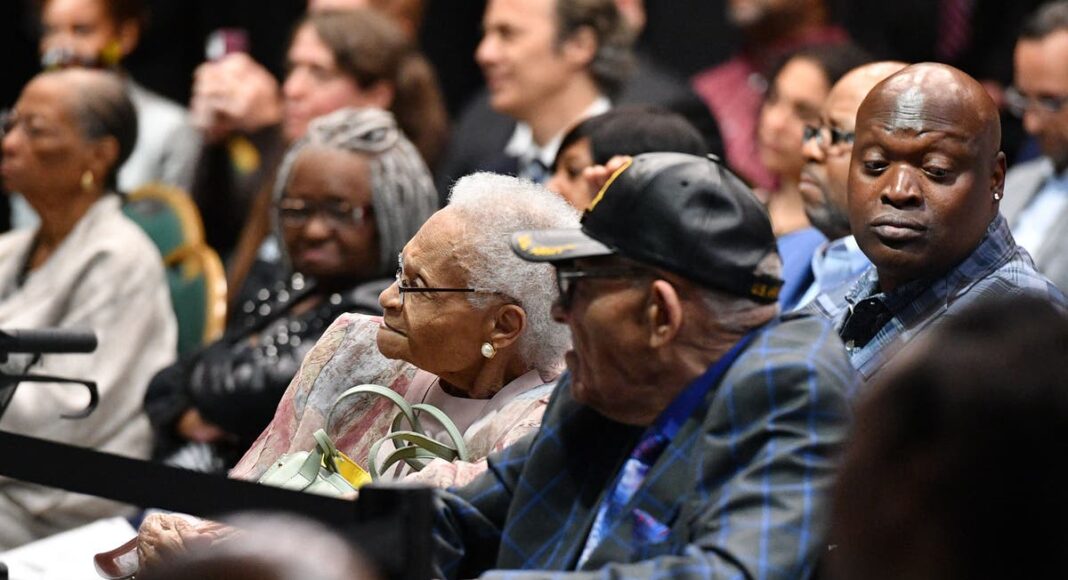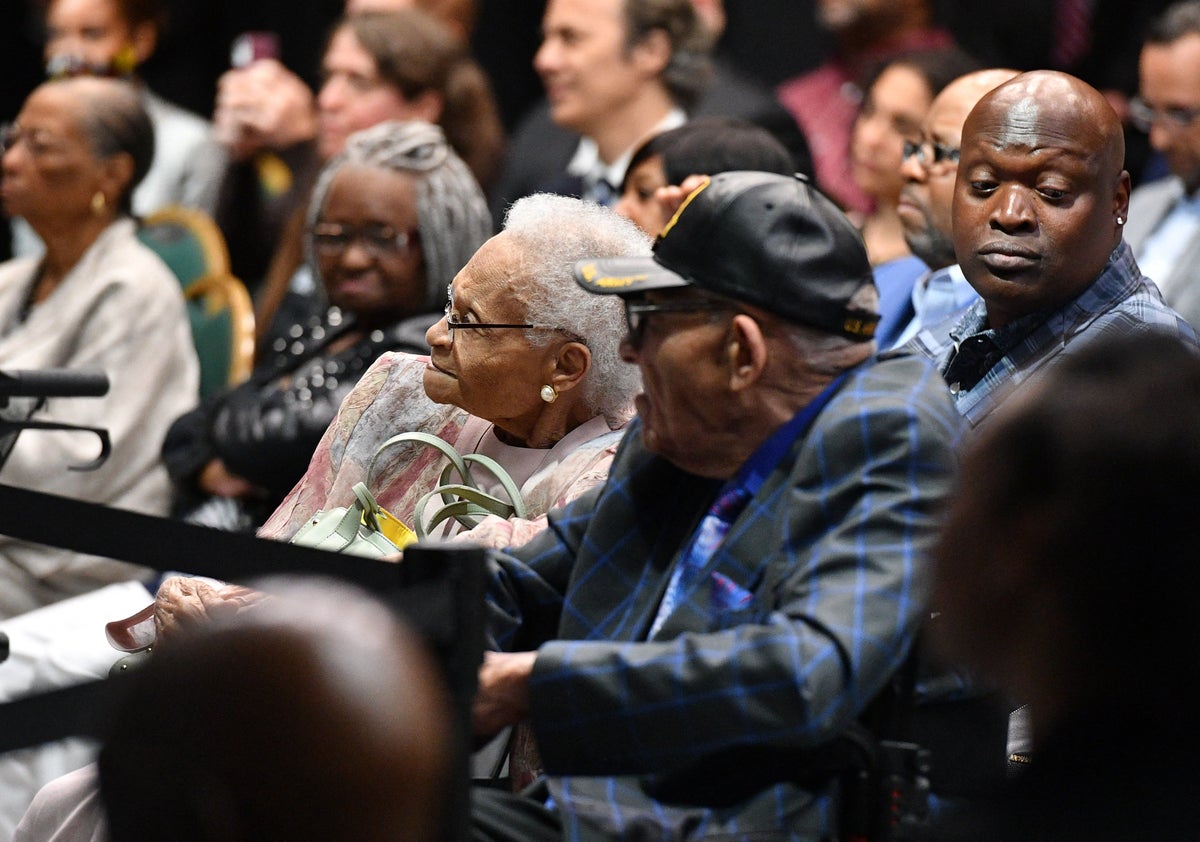Sign up to our Evening Headlines email for your daily guide to the latest newsSign up to our free US Evening Headlines email
The only three known living survivors of the deadliest racist attack in American history are awaiting a court’s crucial decision in a lengthy legal battle more than a century in the making.
Two years ago – on the eve of the 100th anniversary of a brutal two-day attack in a once-thriving Black neighbourhood in Tulsa, Oklahoma – a lawsuit against the city, military officials and other institutions demanded justice for the families and community living in the long, violent shadow of a massacre that left as many as 300 Black people dead and thousands homeless.
On 31 May, 1921, a white mob supported by law enforcement and city officials launched one the bloodiest episodes of racist violence in the 20th century – one in which no one has ever been criminally charged.
Now, 102 years later, a lawsuit from Viola Fletcher, Hughes Van Ellis and Lessie Benningfield Randle – who were all small children during the attack – aims to correct the record about the Tulsa race massacre and establish a fund for survivors and their descendants.
On 10 May, survivors returned to a Tulsa courtroom for a hearing on whether their case against the city and state can continue, after several attempts from defendants to dismiss the case. Ms Fletcher turned 109 years old that day. A decision from Judge Caroline Wall is imminently expected.
“Despite the indisputable facts about the Tulsa race massacre and the ongoing generational damage that it caused, there has not been any constructive, tangible action taken to address and repair its catastrophic harm,” according to a statement from attorney Sara Solfanelli with Schulte Roth & Zabel. “There is a path to justice through the legal system and this lawsuit, and it’s a real opportunity for the survivors to see that justice in their lifetimes.”
Civil rights attorney Damario Solomon-Simmons, who is leading the legal efforts with the Justice for Greenwood Foundation, said the plaintiffs remain “hopeful” that Judge Wall “will do the right thing by our survivors and be the first to take a stand for justice.”
The lawsuit invokes a public nuisance statute, stemming from the 1921 attack, in an attempt to circumvent a statute of limitations for civil suits that prevented previous attempts for plaintiffs recover damages in the years that followed.
The city, state and other defendants, including the Chamber of Commerce and county sheriff’s office, have filed several motions to dismiss the lawsuit in Tulsa County District Court.
John Tucker, an attorney for the Tulsa Regional Chamber, among the defendants in the lawsuit, argued that the court does not have jurisdiction to help right century-old wrongs.
Mr Solomon-Simmons disagrees, pointing to decades of neglect and festering racial disparities that followed two days of violence in Tulsa’s “Black Wall Street” of Greenwood.
Hughes Van Ellis, Lessie Benningfield Randle and Viola Fletcher – the last known living survivors of the Tulsa race massacre – are pictured in 2021, on the 100th anniversary of the attack
( 2021 The Associated Press. All rights reserved.)
A 2001 commission tasked with investigating the massacre said the mob “set fire to practically every building in the African American community, including a dozen churches, five hotels, 31 restaurants, four drug stores, eight doctor’s offices, more than two dozen grocery stores, and the Black public library.”
In their testimony to Congress in 2021, survivors recounted the horrors they witnessed as young children and pressed lawmakers to support their calls for justice.
“They murdered people,” Ms Randle told lawmakers. “I still see it today in my mind … I have survived 100 years of painful memories and losses. By the grace of God, I am still here. I have survived. I have survived to tell this story. I believe I am still here to share it with you. Hopefully, now you all will listen to us while we are still here.”
By the 1960s, Greenwood was beginning to get back on its feet, with Black businesses opening throughout its 35 blocks.
But the long road to recovery would suffer the same systemic impacts of racial violence that reverberated across the US throughout the 20th century, from redlining and the construction of highways through Black neighbourhoods to “urban renewal” initiatives and the use of eminent domain to seize Black-owned property.
In a photo from 2022, crews are pictured working to recover human remains believed to be victims of the Tulsa race massacre from 1921
(The City of Tulsa)
A commission appointed by the Oklahoma state legislature in 1997 spent nearly four years investigating the massacre before issuing four major recommendations to state and local governments, including guidance to make direct payments to survivors and their families.
Most of the recommendations never fully materialised, or have fallen short of community demands and expectations.
The failure to proe comprehensive reparations – and efforts from city and state officials to raise millions of dollars for museums and tourist attractions that profit from the atrocities – have only compounded the harms, according to attorneys and advocates for the survivors.
Last month, a team of researchers hoping to identify victims of the massacre announced they had completed DNA sequencing from remains exhumed from a city cemetery where the bodies of Black residents who were killed in the attacks are believed to have been buried.
Many victims are believed to be buried in unmarked graves, though their locations are unclear. Witnesses have also described bodies being thrown into the Arkansas River or into mass graves.
President Joe Biden, in remarks from Tulsa on the 100th anniversary of the massacre in 2021, called on Americans to reckon with the nation’s troubling past, marking the first time a sitting president has traveled to the city to acknowledge the atrocities.
“We should know the good, the bad, everything,” he said in his address. “That’s what great nations do. They come to terms with their dark sides.”




